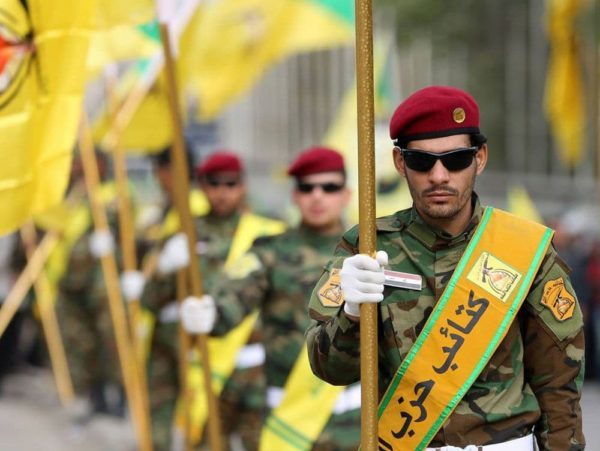If you’ve been focused on Vienna, you watched the U.S. and Iran wander through yet another back-and-forth over Iran’s nuclear program. But the real action was in Syria and in Lebanon.
You might be forgiven for thinking the Biden administration is beginning to take seriously Israel’s worries about a nuclear Iran. According to Walla correspondent Barak Ravid, Israel’s National Security Advisor Eyal Hulata had three primary concerns when he came to Washington last week: first, that the U.S. would agree to Iran’s demand to close the International Atomic Energy Agency investigations into Iran’s undeclared nuclear activity. Second, that the U.S. would ease restrictions on business transactions with Iranian companies linked to the Islamic Revolutionary Guard Corps. And third, that the U.S. would agree to Iran’s demand for a 2.5-year grace period from any renewed sanctions.
Ravid reported, “After Hulata’s trip, the Israeli officials say they are reassured that the U.S. does not plan to give Iran further meaningful concessions.”
So, we’re good, right? Not exactly.
Iranian-sponsored militias hit a U.S. position in Syria last week, and there is some evidence that rockets came from Iraqi territory. U.S. forces responded, destroying three vehicles and some equipment. Officials said they intended to “send a message to Tehran,” although it seems they held off hitting certain targets “‘out of an abundance’ of caution in order to avoid casualties,” according to Politico.
Why would Iran or its minions hit American forces while talks are ongoing? In part to make the point that it has ways to pressure the U.S., but the answer may also lie inside Iraq.
Iraq is having a military-political crisis. In the country’s October 2021 election, the Iraqi people elected anti-Iranian Shiite parties and the pro-Iranian Shiites lost control of parliament. The outgoing Iraqi government has refused to leave office. The anti-Iranian parties, including that of Moqtada al-Sadr (who is equally anti-Iranian and anti-American), have mobilized their supporters outside the parliament, demanding that the new government take office. Iran says no but has been unable to move Sadr and the others.
While Iran spins attacks on American forces as a net positive, American retaliation inside Iraq—or retaliation that killed militia forces—would show that Iran is operating inside Iraq, which would only further inflame Iraqis.
The Biden administration kept its strikes, thus far at least, inside Syria and with only minimal casualties among militia forces.
Meanwhile, in Lebanon, a U.S. envoy has been working on two related items: how to get natural gas into Lebanon and how to delineate the maritime border between Lebanon and Israel. Why? The humanitarian answer is that Lebanon is a collapsed society—it is bankrupt, its people are hungry, it has no exports, and it has no energy.
But the real answer is that a bankrupt Beirut government, controlled by Hezbollah (itself controlled by Iran), has nothing with which to bribe the people to remain under its control.
In the short term, U.S. energy envoy Amos Hochstein’s goal is to get Egyptian natural gas to Lebanon. There are no pipelines and Hezbollah refuses Israeli natural gas that could come by sea. But that won’t stop Hochstein: “In order to get the gas, you have to come through somewhere. Egypt has to go through somewhere. Israel is probably not the right place for it to come, and therefore [sending gas from Jordan by way of] Syria is the only option.” So, Egypt and Jordan—adversaries of Iran—are going to be used to help Syria, which will take a cut of the gas, and Iran’s proxies in Lebanon.
In addition, if Lebanon could extract gas from gas fields in the Mediterranean—in a location currently disputed between Israel and Lebanon—the larger crisis could, perhaps, be mitigated. And Hezbollah/Iran could maintain its iron grip on the people of Lebanon.
So the U.S. is helping Iran hold onto control in Beirut by facilitating energy exports.
The unfortunate reality is that Israel and the U.S. are not entirely on the same page regarding either Lebanon or Iran. National Security Advisor Hulata was supposed to meet with U.S. Secretary of State Antony Blinken last week, but instead met with Deputy Wendy Sherman—a strong supporter of the 2015 nuclear deal and a new Iran deal. The State Department statement mentioned Iran—once—but continued on for a paragraph about Shireen Abu Akleh, Palestinian NGOs, and the “two-state solution.”
And Israel’s defense minister Benny Gantz arrived shortly thereafter only to discover that Defense Secretary Lloyd Austin had left town and the president was “on vacation.”
Hardly the actions of a government sympathetic to Israel’s concerns about a nuclear Iran.
The views expressed in this article are the writer’s own.
NEWSWEEK


Leave a Reply
You must be logged in to post a comment.